|
|
|
Sort Order |
|
|
|
Items / Page
|
|
|
|
|
|
|
| Srl | Item |
| 1 |
ID:
139831
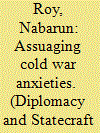

|
|
|
|
|
| Summary/Abstract |
This analysis examines how Indian diplomacy enabled Burma and Ceylon to turn down requests by the West to join the Southeast Asian Treaty Organisation [SEATO]. It shows how this diplomacy allowed elements in Burma and Ceylon that favoured a non-aligned approach to hold their own in the face of calls to join SEATO. Contrary to the depiction of Indian diplomacy as being simply idealistic and given to pious invocations, this article shows how India used different resources to strengthen the non-aligned constituency in the region. It also shows that whilst many de-colonised states favoured non-alignment, threats to their security led some to align with the Great Powers. Whilst Burma and Ceylon did perceive a clear threat from communism, the example set by India in its own foreign policy, its aid policies, and its relationship with China helped them reduce their fear of communism and stay committed to non-alignment.
|
|
|
|
|
|
|
|
|
|
|
|
|
|
|
|
| 2 |
ID:
139825
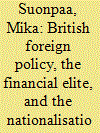

|
|
|
|
|
| Summary/Abstract |
The analysis examines the role of British financial institutions, namely the Bank of England and the Corporation of Foreign Bondholders [CFB], in the making of British policy towards Turkey. The nationalisation of the Constantinople Quays Company, a port operator purchased in 1907 by the British and French governments, serves as a case study through which business–state relations, the role of finance in the conduct of international relations, and the impact of perceptions on policy decisions are explored. In this case, the financial elite’s role was minimal during most of the period considered, becoming more important in the final war years in a framework of the Anglo–Turkish debt restructuring negotiations of 1944. Significantly, the CFB, rather than the Bank, represented the British government in the negotiations. There exists an abundance of evidence of the divergent views between Whitehall and the financial elite about Turkey’s trustworthiness as a debtor and a signatory to treaties. The British government’s perceptions were much more positive than those of the financial elite. This difference stemmed from the different interests involved: Whitehall sought to secure Turkey’s collaboration in the increasingly unstable global security environment while the Bank and the CFB were more concerned with investor and bondholder interests and attempted to avoid further financial losses.
|
|
|
|
|
|
|
|
|
|
|
|
|
|
|
|
| 3 |
ID:
139827
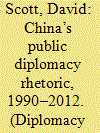

|
|
|
|
|
| Summary/Abstract |
During Hu Jintao’s period of leadership, careful public diplomacy language was deployed by the People’s Republic of China from 2000–2012 to describe the international system and China’s role within it. The terms looked at in this analysis are those introduced in the 2000s to recalibrate the ‘multi-polarity’ [shijie duojihua] emphasis of the 1990s. These terms have been deployed within a general ‘reassurance diplomacy’ that emphasised concepts like ‘responsible Great Power’ [fuzeren da guo], ‘multi-lateralism’ [duobian zhuyi], ‘good neighbourhood policy’ [mulin zhengce], ‘democratisation of international relations’ [guoji guanxi mingzhuhua], ‘peaceful rise’ [heping jueqi], ‘peaceful development’ [heping fazhan] and ‘harmonious world’ [hexie shijie]. Ambiguities, implications, impact, and tensions surrounding these terms are considered, and China’s deliberate adjustments pinpointed. China’s soft power intentions emerge from its instrumentalist use of diplomatic rhetoric, though a credibility gap also emerged between actions and words by 2012.
|
|
|
|
|
|
|
|
|
|
|
|
|
|
|
|
| 4 |
ID:
139830
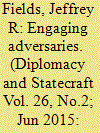

|
|
|
|
|
| Summary/Abstract |
American policy-makers and politicians present specious rationales for abjuring diplomatic engagement with adversarial regimes and actors. The conventional wisdom is that negotiating with adversaries is futile and a form of reward that the enemy will exploit. This tool of statecraft, therefore, should be avoided. However, many of the objections for avoiding diplomacy are suspect when examined closely. In addition, though prominent adversaries like Iran have generally shunned the United States, it has regularly engaged other hostile and adversarial regimes and non-state actors. The selective use of specious reasons contributes to an American foreign policy that often prefers the isolation and containment of ‘rogue states.’ Additionally, myths like the futility of appeasing adversaries have taken hold, and practitioners rarely question it. The post-Cold War American ‘diplomacy allergy’ is often counter-productive and stands in contrast to Cold War pragmatism.
|
|
|
|
|
|
|
|
|
|
|
|
|
|
|
|
| 5 |
ID:
139828
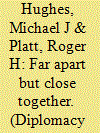

|
|
|
|
|
| Summary/Abstract |
A good deal has been written about the organisation and structure of the British diplomatic establishment since 1945. This analysis uses detailed quantitative and qualitative data to develop an understanding of the background and career trajectories of the most senior figures in the Diplomatic Service in 1975. By tracing their careers, it is possible to identify more precisely than before the changing educational and social background of these individuals when compared with previous generations of diplomats. This analysis also examines certain core features of the culture of the diplomatic establishment during the post-war decades, analysing how it both shaped and was shaped by particular structures and practices. Despite the existence of a peripatetic career structure that dispersed members of the diplomatic establishment around the globe, there were still numerous opportunities for the kinds of personal contact necessary to maintain an integrated culture.
|
|
|
|
|
|
|
|
|
|
|
|
|
|
|
|
| 6 |
ID:
139826


|
|
|
|
|
| Summary/Abstract |
The Yugoslav Federation never satisfactorily resolved the problem posed by the Albanians of Kosovo. Emerging from a period of intense repression, Kosovo in the 1960s and 1970s underwent rapid political development, including the creation of autonomous political institutions. The Kosovo issue was directly affected by developments in Albano–Yugoslav relations—themselves subject to events in the wider world—and by internal developments within Yugoslavia, in which Albania had a strong interest. Throughout the period the issue remained a staple in Albania’s ideological war with Yugoslavia. Wary of the official Kosovar political leadership and suspicious of the nascent Kosovar national movement, Albania was alarmed by Kosovar demands for republican status. Ironically, the reaction of Albania and Yugoslavia to these demands was not dissimilar. This study is based on an analysis of recent historical research, as well as on recently released documents from Kosovar, Albanian, Serbian, and American archives.
|
|
|
|
|
|
|
|
|
|
|
|
|
|
|
|
| 7 |
ID:
139832
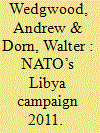

|
|
|
|
|
| Summary/Abstract |
Colonel Muammar Qaddafi’s violence against the Libyan population in the face of a fledgling rebellion in March 2011 prompted an international intervention. The United Nations Security Council authorised the use of ‘all necessary measures’ to protect civilians and enforce a no-fly zone. Following a preliminary American-led military intervention, the North Atlantic Treaty Organisation sponsored a seven-month campaign, ‘Operation Unified Protector.’ Was the operation ethically justified? Through the lens of the Just War tradition, seven moral principles are assessed in both qualitative and quantitative fashion. The analysis applies the novel Just War Index to the 2011 case concluding that it exhibited a moderate degree of justness overall. Still, significant flaws and ethical problems emerged. While high evaluations were made of just cause, legitimate authority, last resort and right conduct, lower assessments were given for right intent, net benefit, and proportionality of means. The outcome of the intervention is still unknown, but the broad outlines of a moral assessment are distinguishable.
|
|
|
|
|
|
|
|
|
|
|
|
|
|
|
|
| 8 |
ID:
139824
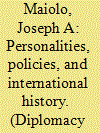

|
|
|
|
|
| Summary/Abstract |
This brief essay pays tribute to the contribution of Donald Cameron Watt (1928–2014) to the historiography of twentieth-century international history and the origins of the Second World War in Europe. It sets out his characteristic approach to the field, especially the emphasis he placed on the beliefs and perceptions of key decision-makers in the international system in explaining how and why events occurred the way they did. This essay suggests that Donald Watt’s approach to international history was shaped by the connexion he felt with the post-1919 founders of the field and by his own experiences in the immediate aftermath of the Second World War.
|
|
|
|
|
|
|
|
|
|
|
|
|
|
|
|
|
|
|
|
|